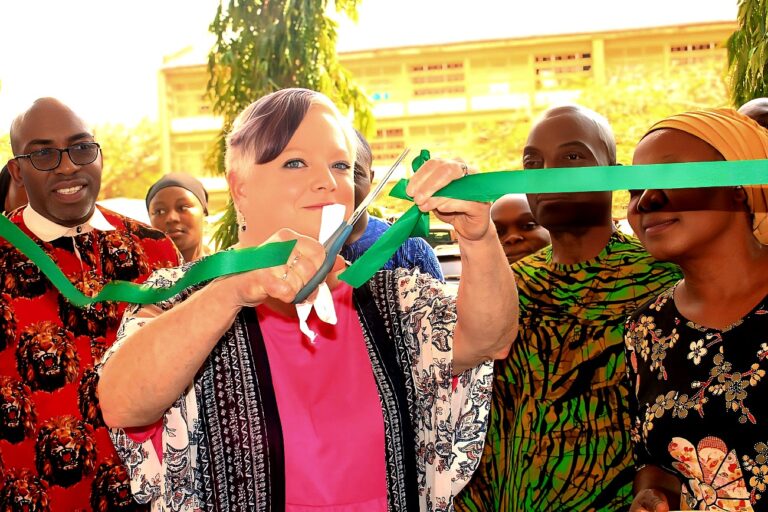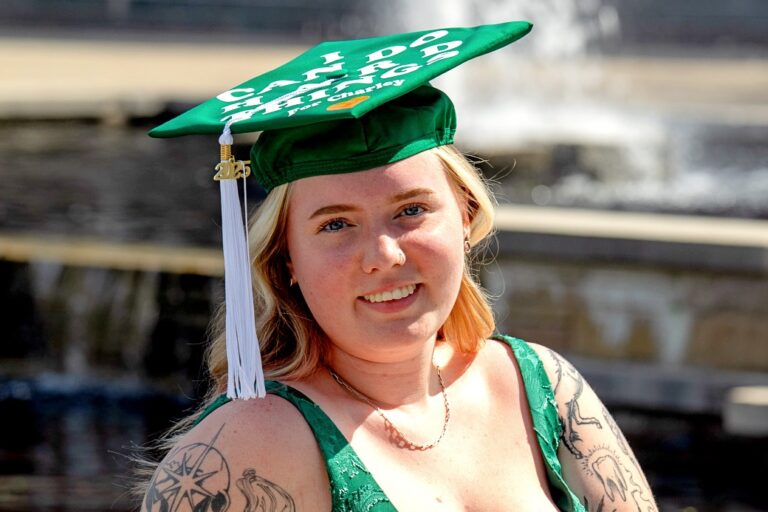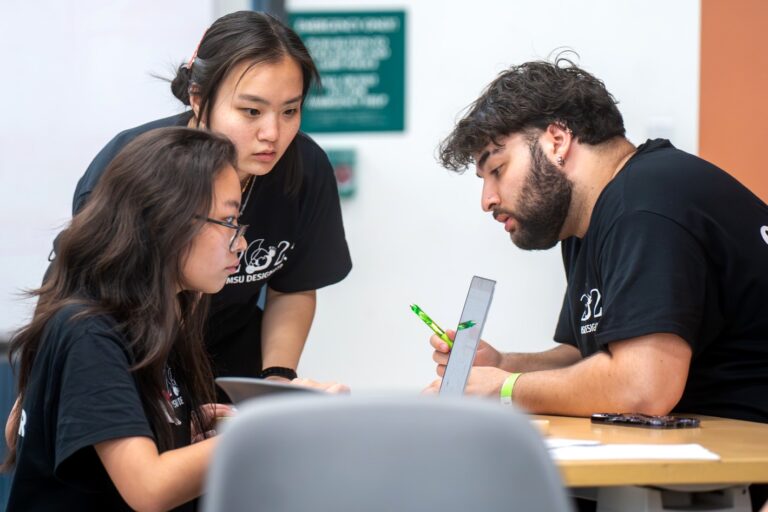Michigan State University’s First-Year Writing (FYW) Program has been recognized as a national model of excellence by the Conference on College Composition and Communication (CCCC), the largest and most influential national organization in the field of composition and rhetoric. The FYW Program at MSU is one of only eight writing programs across the country to receive a 2022-2023 CCCC Writing Program Certificate of Excellence.
The CCCC is a constituent organization within the National Council of Teachers of English (NCTE), the professional organization of educators of English and the language arts. Established in 2004, the CCCC Writing Program Certificate of Excellence honors up to 20 writing programs per year, recognizing programs that imaginatively address the needs and opportunities of students, instructors, institution, and locale; that demonstrate current best practices in the field and effective placement procedures; and that model diversity and/or serve diverse communities.

The CCCC selection committee described MSU’s First-Year Writing Program as a “strong model of pedagogical and labor leadership. Built with transfer and diversity learning goals, the writing courses ask students to consider their literacy practices in critical, rhetorical contexts.”
Housed within MSU’s Department of Writing, Rhetoric, and American Cultures (WRAC), the FYW Program serves nearly every incoming student at Michigan State University, with more than 7,000 students enrolling in FYW courses (WRA 101 or 195H) in a typical year. The program is led by an administrative team that includes Dr. Julie Lindquist, Director; Dr. Joyce Meier, Associate Director; Mike Ristich, Online Curriculum Coordinator; Keaton Kirkpatrick, FYW Graduate Assistant; and Roland Dumavor, FYW Graduate Fellow.
“It’s about teaching students how to be good learners of writing. The whole idea is to provide them with experiences that help them set goals for what happens next.”
Designed to acclimate students to the University and to help them articulate their educational goals, the FYW Program helps students build on prior knowledge to learn writing, thinking, and problem-solving strategies, with a goal of developing transferable knowledge and capacities that will serve them in their educational journeys through their college experiences and in their lives as professionals and citizens.
Lindquist emphasizes that the program is about more than simply preparing students to emerge as writers capable of writing in designated modes, media, or genres.
“It’s about teaching students how to be good learners of writing,” Lindquist said. “The whole idea is to provide them with experiences that help them set goals for what happens next, rather than teach them how to write in particular genres that may or may not pertain to their futures as students and professionals.”

The FYW Program focuses on teaching students how to engage writing problems and rhetorical situations, rather than on teaching them a limited repertoire of written genres. The idea is to equip students with transferable learning and a sense of confidence and efficacy as writers.
Writing projects, accompanied by frequent opportunities for reflection and goal setting, are intended to be opportunities for students to discover their pathways and build confidence as capable writers and learners. The program takes as a foundational principle that students’ prior (cultural and linguistic) knowledge is an important asset for their educational projects and futures, so students are invited into inquiries, related to their experiences and interests, and into how these may be useful and productive not only for the writing they produce but for their ongoing learning.
“If students leave our classes with a developing sense of how to think and write toward equitable social processes, that’s a good outcome.”
“Our projects are designed to get students to ask themselves: Who am I, what do I want, and what do I already know that could be useful?” Lindquist said. “Everyone has a set of literacies, everyone has knowledge, everybody has language, everybody has ideas and experiences they can bring to the educational project. We want students to feel and understand that what they have is useful and good, and that their histories can be assets for their futures.”
“If students leave our classes with a developing sense of how to think and write toward equitable social processes, that’s a good outcome,” Lindquist said.
The CCCC selection committee also praised MSU’s program for its efforts in the area of Diversity, Equity, and Inclusion (DEI), noting that “MSU has recently developed a Directed Self Placement metric to further support student agency within DEI efforts. Training and professional development prioritize faculty and GTA knowledge and input, while program practices demonstrate humane labor practices.”

While building each student’s writing, thinking, and problem-solving skills, FYW instructors work with writers who are often classified as underprepared, as well as students who are learning English as a second or third language. They also ask students to consider their own experiences within contexts of diversity, equity, and social justice. In the past three years, the program has explicitly emphasized ways of thinking, learning, and writing, as well as forms of assessment, that enact anti-racist principles and move toward anti-racist goals.
Most of the FYW courses are taught by full-time, fixed-term, teaching-focused faculty within the WRAC Department. Maintaining a stable cohort of FYW instructors and faculty year after year has helped build a highly skilled, invested community of educators who are encouraged to continue to work together as learners and innovators. This past year, WRAC acquired seven new teaching-focused faculty members to join their community of FYW teachers.
“We want students to feel and understand that what they have is useful and good, and that their histories can be assets for their futures.”
“We are always thinking and talking together about what it means to teach first-year writing, about how to do it better, and about what we’re learning from our students,” Lindquist said. “We have a tight cohort of people who teach FYW and who see it as a project, which is a little different from many other universities in the sense that our classes in first-year writing are not primarily staffed by graduate student, part-time, or adjunct labor.”
Lindquist credits the collaboration between faculty as one of the main factors of the program’s success. This collaborative culture didn’t always exist. When Lindquist arrived in 2002, there was no shared set of programmatic learning goals and curricula for FYW classes were primarily developed in relation to the particular scholarly interests of teaching faculty. WRAC’s very first FYW Director, Dr. Nancy DeJoy, was responsible for making what was formerly a set of independent, content-based courses into a writing program, with an emphasis on students’ needs as learners, a common curriculum, and a set of learning goals.

“Now we have a writing program, not just a collection of classes,” Lindquist said. “We have a shared set of learning goals that value inquiry, discovery, and communication. We have a common learning experience built around a set of five writing projects. We have a curriculum that enacts values of inclusivity and educational access, and an assessment model that is equitable. The FYW Program is a space of learning and continued intellectual energy. Those in WRAC who teach FYW are invested in the work in front of them, and it’s work those of us who do it enjoy. Those (faculty and TAs) who teach first-year writing are highly invested in teaching FYW classes (WRA 1004/0102, WRA 101, and 195H) and they are committed to student success.”
Lindquist also credits the leadership and vision of former FYW Director Dr. Bump Halbritter, whose ideas about the role of reflective writing and equitable assessment have been instrumental to the program’s mission to serve and support the learning needs of all students.
“The FYW Program is a space where students are invited to figure out what they want to do, consider what their own educational projects are, and imagine what their futures can look like.”
Lindquist believes that the FYW Program is an essential experience for students during their first year at MSU. The program strives to be accessible to all learners and their needs, and it empowers students to make use of the resources available at MSU, while also teaching them skills that will serve them throughout their academic careers – problem-solving, planning, reflecting, and collaborating, to name a few. It also gives students a space to take stock of their assets for learning, to build confidence, and to explore possibilities for their futures.
Written by Austin Curtis and Kim Popiolek
c


